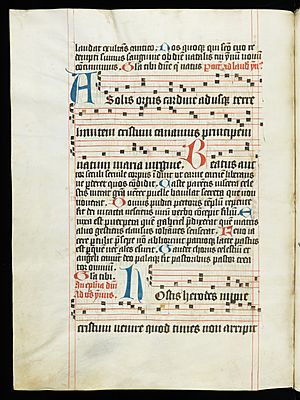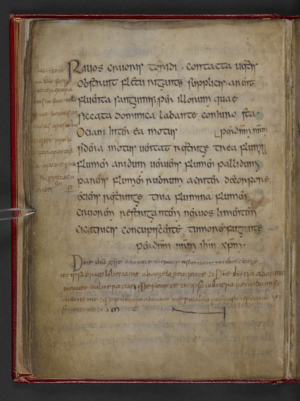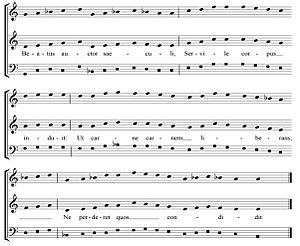
A solis ortus cardine in a book from the 1400s.
"A solis ortus cardine..." is a very old poem written in Latin. Its name means "From the Pivot of the Sun's Rising." A poet named Coelius Sedulius wrote it around the year 450 AD. The poem tells the story of Jesus Christ's life, from his birth to his return to heaven.
What makes this poem special is that its 23 verses each start with a different letter of the Latin alphabet, in order. This style is called an abecedarius. It's one of the oldest parts of the Catholic Church's worship songs. Two famous hymns were made from parts of this poem. Over time, people translated it into many languages, including Anglo-Saxon and German. A very important German translation was made by Martin Luther during the Protestant Reformation. Many famous composers, like Dufay, di Lasso, Praetorius, Palestrina, and Bach, have created music for this poem.
The Story of the Poem

The 17th verse of
A solis in an old prayer book from the late 700s or early 800s.
A solis ortus cardine... is a Latin hymn written by Sedulius in the early 400s. This poem uses 23 stanzas, each with four lines, to tell about Jesus's birth, his amazing acts (miracles), and his suffering.
This poem and other writings by Sedulius were very popular. They were used in churches and schools from ancient times through the 1600s. The famous writer Bede even mentioned the poem's first words in his book De Arte Metrica. The 17th verse, which talks about Jesus healing a bleeding woman, was even used as a special charm in the Middle Ages to stop bleeding.

An early musical version of the 2nd verse of
A solis ortus cardine.
The first seven verses of the poem, plus an extra verse praising God, became a Christmas hymn. This hymn has been sung since the early Middle Ages. It talks about the huge difference between God's power and the humble human form of baby Jesus. In 1589, Palestrina set some of these verses to music for the Vatican. The odd-numbered verses were sung with his music, while the even-numbered ones were sung in Gregorian chant, which is a simple, ancient style of church music.
In early England, during the time of Henry VIII, this Latin hymn was often sung in three parts. This style, called a faburden, added two voices to the main melody. However, this type of music became less common when Edward VI became king. During the English Reformation, many church choirs were closed, and organs were taken apart.
Martin Luther translated the first seven verses into a German hymn called "Christum wir sollen loben schon". For a long time, this was the main German Protestant Christmas hymn. Johann Sebastian Bach also used this hymn in his music, including his cantata Christum wir sollen loben schon.
Other verses from Sedulius's poem (verses 8, 9, 11, and 13) were also used. With an added verse of praise, they became another hymn called "Hostis Herodes impie..." (meaning "O Herod, you impious foe..."). This hymn was sung for Epiphany, a Christian holiday. These verses tell the story of Herod the Great, the Three Kings, Jesus's baptism, and the miracle at the wedding in Cana. Luther also translated this hymn into German, but that version is not used much anymore.
In the Catholic Church today, the original Latin versions of "A solis ortus cardine" and "Hostis Herodes impie" are still sung. Their melodies are very old, dating back to the 400s. Over time, some of the fancy musical parts were simplified, but many parts of the original tunes still remain, even in Luther's versions.
The Poem's Words
Below is the original Latin text of A solis ortus cardine and a simple English translation. Many people have translated parts of this poem over the centuries, including into Anglo-Saxon and German.
-
- A solis ortus cardine
- ad usque terrae limitem
- christum canamus principem,
- natum maria virgine.
-
- Beatus auctor saeculi
- servile corpus induit,
- ut carne carnem liberans
- non perderet quod condidit.
-
- Clausae parentis viscera
- caelestis intrat gratia;
- venter puellae baiulat
- secreta quae non noverat.
-
- Domus pudici pectoris
- templum repente fit dei;
- intacta nesciens virum
- verbo concepit filium.
-
- Enixa est puerpera
- quem gabriel praedixerat,
- quem matris alvo gestiens
- clausus ioannes senserat.
-
- Foeno iacere pertulit,
- praesepe non abhorruit,
- parvoque lacte pastus est
- per quem nec ales esurit.
-
- Gaudet chorus caelestium
- et angeli canunt deum,
- palamque fit pastoribus
- pastor, creator omnium.
-
- Hostis herodes impie,
- christum venire quid times?
- non eripit mortalia,
- qui regna dat caelestia.
-
- Ibant magi, qua venerant
- stellam sequentes praeviam,
- lumen requirunt lumine,
- deum fatentur munere.
-
- Katerva matrum personat
- conlisa deflens pignora,
- quorum tyrannus milia
- christo sacravit victimam.
-
- Lavacra puri gurgitis
- caelestis agnus attigit,
- peccata quae non detulit
- nos abluendo sustulit.
-
- Miraculis dedit fidem
- habere se deum patrem,
- infirma sanans corpora
- et suscitans cadavera.
-
- Novum genus potentiae:
- aquae rubescunt hydriae
- vinumque iussa fundere
- mutavit unda originem.
-
- Orat salutem servulo
- flexus genu centurio,
- credentis ardor plurimus
- extinxit ignes febrium.
-
- Petrus per undas ambulat
- christi levatus dextera:
- natura quam negaverat
- fides paravit semitam.
-
- Quarta die iam fetidus
- vitam recepit lazarus
- mortisque liber vinculis
- factus superstes est sibi.
-
- Rivos cruoris torridi
- contacta vestis obstruit,
- fletu rigante supplicis
- arent fluenta sanguinis.
-
- Solutus omni corpore
- iussus repente surgere,
- suis vicissim gressibus
- aeger vehebat lectulum.
-
- Tunc ille iudas carnifex
- ausus magistrum tradere,
- pacem ferebat osculo,
- quam non habebat pectore.
-
- Verax datur fallacibus,
- pium flagellat impius,
- crucique fixus innocens
- coniunctus est latronibus.
-
- Xeromyrram post sabbatum
- quaedam vehebant compares,
- quas adlocutus angelus
- vivum sepulcro non tegi.
-
- Ymnis, venite, dulcibus
- omnes canamus subditum
- christi triumpho tartarum,
- qui nos redemit venditus.
-
- Zelum draconis invidi
- et os leonis pessimi
- calcavit unicus dei
- seseque caelis reddidit.
|
-
- From the pivot of the sun's rising
- To the farthest edge of the earth
- Let us sing to Christ our lord
- Born of the virgin Mary.
-
- Blessed creator of the world
- Assuming the body of a slave,
- Freeing our flesh with his own flesh
- That what he made might not be lost.
-
- A close-barred maiden's inner parts
- Were breached by the grace of heaven;
- Burdened was the maiden's womb
- With secrets that she did not know.
-
- Quickly the home of her chaste breast
- Became the temple of the Lord;
- Untouched without knowledge of men,
- By the word she conceived a son.
-
- She laboured and then brought forth
- The One foretold by Gabriel;
- John, still in his mother's womb,
- Sensed it, as he leapt with joy.
-
- He bore with lying in the hay,
- He did not scorn the manger,
- And on a little milk He fed,
- Who let no bird in want of food.
-
- The heavenly choir was glad
- And angels of God's coming sang,
- To the shepherds they did unfold
- The Shepherd and Maker of all things.
-
- O Herod, you impious foe,
- Why fear the coming of Christ?
- Earthly realms he does not seize,
- The kingdom of heaven he gives.
-
- The wise men journeyed towards the star
- Which led them on their coming.
- Seeking one Light with another,
- Their gifts proclaimed him God.
-
- A multitude of mothers cried out,
- Weeping at their children's deaths;
- Slain by the tyrrant in thousands,
- Sacrificial victims for Christ.
-
- Into the streams of pure water
- Entered the heavenly Lamb;
- Taking on Himself the sins of the world,
- With his cleansing we were absolved.
-
- By miracles did he give proof
- That he had God as father;
- Healing those sick in body,
- Bringing back the dead to life.
-
- Yet new kinds of powers!
- The water in the ewers turned red,
- And, when ordered to pour with wine,
- The source of the flow was changed.
-
- On bended knee a centurion
- Begged for his servant's health;
- The burning ardour of his faith
- Put out the fever's flames.
-
- Peter walked forward through the waves,
- Held fast by Christ's right hand.
- Where nature denied there was a way
- His faith a footpath made.
-
- On his fourth malodorous day,
- Lazarus recovered his life,
- And, once freed from the shackles of death,
- Became heir unto himself.
-
- Streams of flowing gore were stopped,
- With one touch to His robes;
- The running tears of the suppliant
- Dried up the torrents of blood.
-
- Lifeless in all his body,
- But suddenly commanded to rise,
- A sick man could on his own again
- Carry away his bed.
-
- Then that hangman Judas,
- Having dared betray his master,
- Peace did offer with a kiss,
- Which came not from his heart.
-
- The truthful was betrayed to liars
- The pious was scourged by the godless,
- The untainted was nailed to the cross,
- Sharing his lot with thieves.
-
- As Sabbath passed, anointing myrrh
- Was brought by women of His fellowship
- To whom an angel said: He lives,
- He lies no longer in the tomb.
-
- Come let us with dulcet hymns
- Join to sing of the overthrow
- Of Tartarus by the triumph of Christ
- Who, though sold, redeemed us all.
-
- The zeal of the envious serpent,
- The jaws of the fearsome lion,
- God's only son did trample down
- Then rise back into the heavens.
|
|
Gallery
-
Bede mentions A solis in his book De arte metrica, around 800 AD.
-
-
Page 2 of A solis from Canterbury.
-
-
Page 2 of A solis in the Leofric Collectar.
-
Part of A solis with Anglo-Saxon notes, 1000s.
-
Page 1 of A solis in a German prayer book, 1477.
-
Page 2 of A solis in a German prayer book.
-
Page 3 of A solis in a German prayer book.
-
Page 4 of A solis in a German prayer book.
-
-
Page 1 of A solis in an Antiphonarium, 1618.
-
Page 2 of A solis in an Antiphonarium.
-
Page 3 of A solis in an Antiphonarium.


















